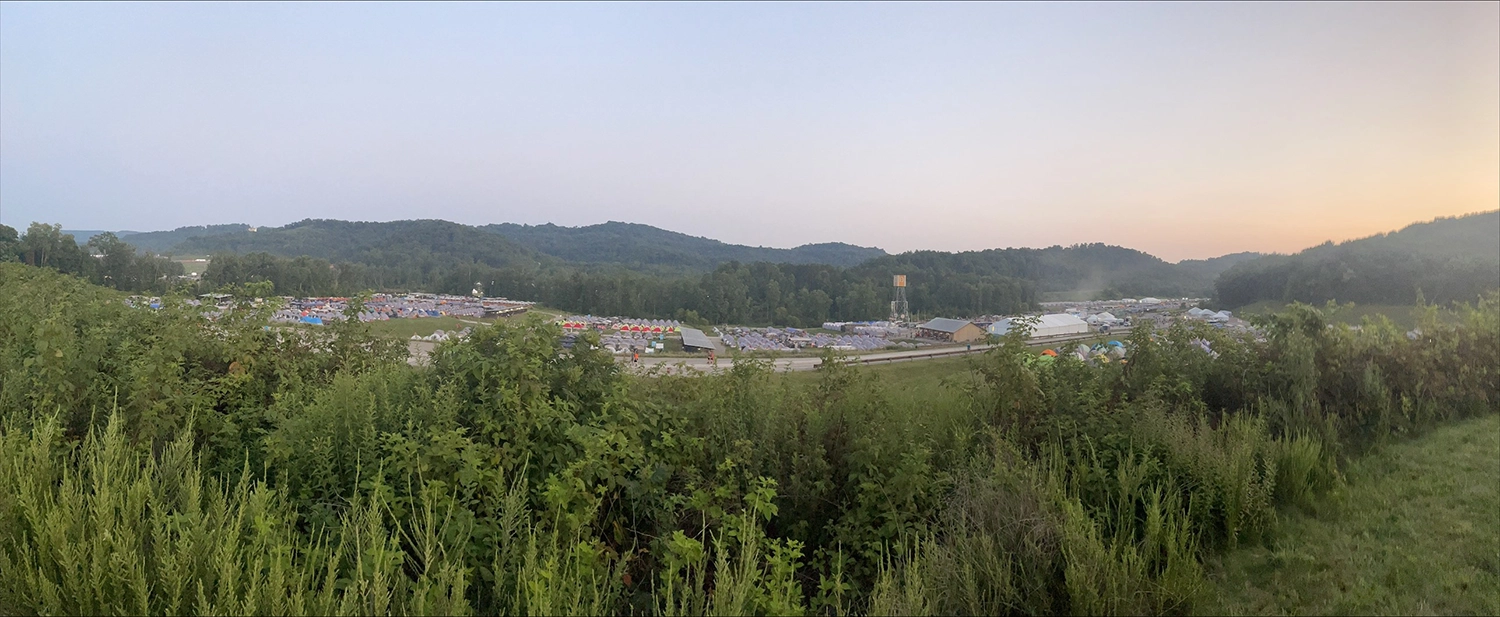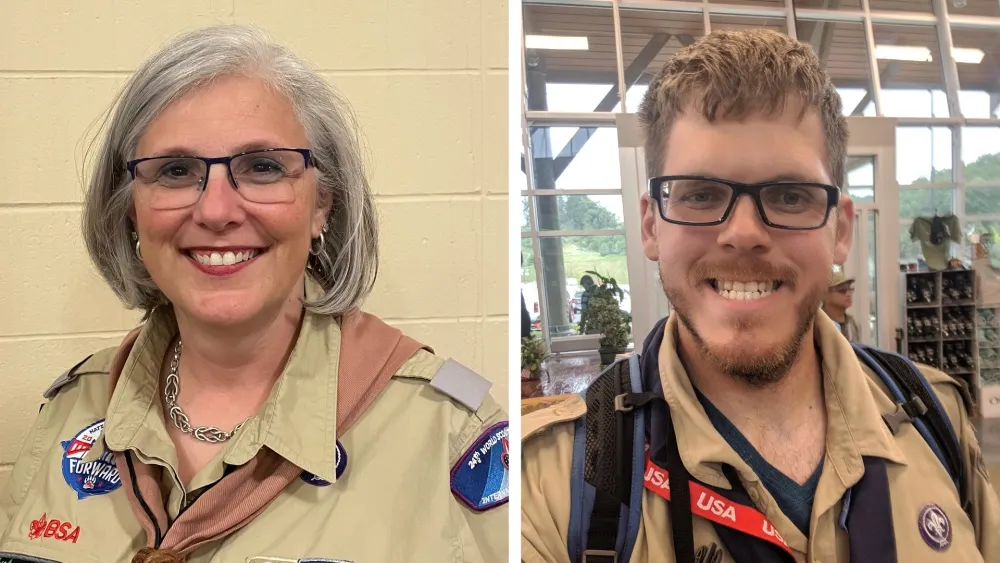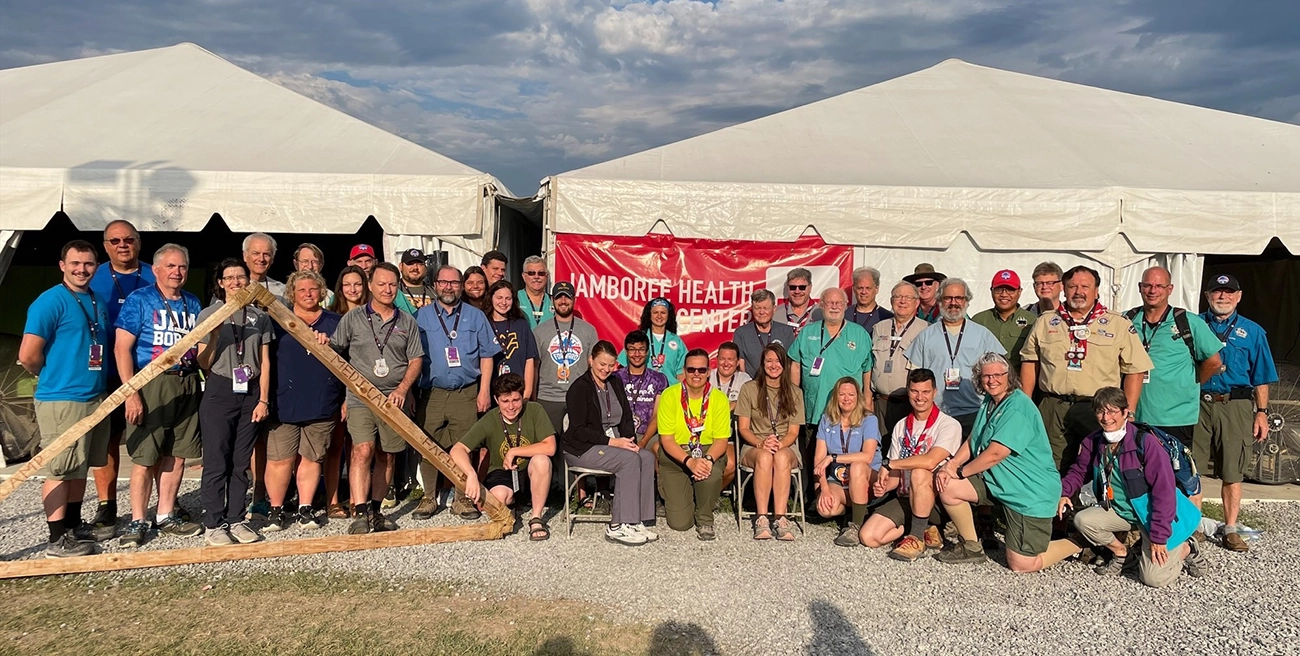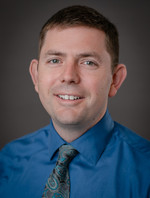
Our People
‘Not the Scout Camp You Remember’: Methodist Employees Take The Meaning of Care to Jamborees Attended by Thousands
Published: Nov. 20, 2023

To get a feel for just how large Scouts BSA’s National Jamboree is, just go for a walk.
“It’s a two-hour walk from one side to the other,” said Colleen Steinhauser, MSN, RN, Gero-BC, CHSE, a Nebraska Methodist College (NMC) assistant professor who recently returned from this year’s event. “This is not the Scout camp you remember.”
The jamboree – a nine-day gathering of Scouts, adult leaders and volunteers involved with Scouts BSA (also known as Boy Scouts of America) – occurs every four years at Summit Bechtel Reserve in West Virginia. This year, 15,000 visitors descended on the 16-square-mile camp for activities that included zip-lining, mountain biking, BMX racing and skateboarding – as well as more traditional Scouting activities like fishing, shooting sports, climbing, swimming and camping.
With so many people and activities, there’s bound to be a need for medical care. That’s where volunteers like Steinhauser and Matthew Sobczyk, BSN, RN, SCRN, a neurology triage nurse at Methodist Physicians Clinic, come in.
“I Love the Program”
Steinhauser earned her bachelor’s in nursing from NMC in 1994 and began working in a nursing home. She went on to get her master’s in nursing education and teach at two area schools before returning to NMC to teach. Fifteen years later, she has no regrets about coming back to Methodist.
“I love the people that I work with,” she said. “I’ve also been lucky enough to have the flexibility and support to do the crazy things I do. My coworkers think I’m nuts to live in a tent for two weeks and volunteer my time.”
Steinhauser didn’t just wake up one day and decide to help at the jamboree. A former Girl Scout herself, she became active as a volunteer leader when her four sons went through the Scouting program. Today, she’s the committee chair for Boy Scout Troop 99 in Omaha and crew leader for a Sea Scouts ship. She also sits on a national task force that reviews health policies for Scouts, works with a national group developing wilderness first aid materials and is active in helping plan future jamborees.
“I love the program, and it’s my way of giving back to the program that made two of my four children Eagle Scouts,” she said. “Just to see that change in some of these young men really makes a difference.”
From Scout to Scout Leader
Sobczyk has worked for Methodist since earning his bachelor’s in nursing from NMC in 2016. He spent six years on the Methodist Hospital Ortho/Neuro Unit before moving to his current role.
“Methodist is the most patient care-oriented place I have ever worked,” he said. “I definitely feel like we always have our patients at heart, and we always do what we can to give our patients the best possible care.”
Sobczyk’s Scouting journey began in the 1990s. After completing the Cub Scout program, he joined the Boys Scouts as a sixth-grader and earned his Eagle Scout rank in 2009. When he turned 18, he knew he wanted to become involved as a leader. He is currently an assistant scoutmaster for Boy Scout Troop 60 in Papillion and is working toward becoming the troop’s scoutmaster.
“What I saw the adult leaders doing for me – helping me with merit badges, going on camp outs and growing as an individual when I was a teenager – I want to give that same expertise and experience to a lot of kids that are going through it now,” he said.

This view of the National Jamboree shows two of the six camps that the Jamboree Health Center provided care for this year.
Teaming Up to Give Back

Steinhauser’s first jamboree was in 2013. Her oldest son was attending, and she responded to a call for medical professionals to volunteer. She’s since attended two more national jamborees – in 2017 and for this year’s event, which was postponed from 2021 by the COVID-19 pandemic.
Steinhauser met Sobczyk when he was a nursing student at NMC. She remembers telling her class she wouldn’t be available by phone while she was camping with local Boy Scouts. After the class, Sobczyk shared his Scouting experience and found a kindred spirit. Upon receiving his nursing license, he began teaming with Steinhauser to provide medical care at area Scouting events.
When she asked him to join her in West Virginia at the 2019 World Scout Jamboree – an event attended by over 40,000 Scouts and leaders – there wasn’t much debate.
“I realized I couldn’t miss out on an opportunity to do something like this,” he said.
Ready for Anything
Among Summit Bechtel Reserve’s features: The largest man-made outdoor climbing facility in the U.S., 33 miles of mountain biking trails and a skateboard park designed by Tony Hawk.
“They take everything to the next level,” Steinhauser said.
That includes being prepared to care for the gamut of medical conditions.
This year, Steinhauser was among 59 medical professionals from across the country who staffed the Jamboree Health Center, the main medical hub that essentially functions as a critical access hospital. She acted as the chief nursing officer this year. Common ailments she and other volunteers cared for included dehydration, heat exhaustion, respiratory infections and broken bones.
“A lot of them, they weren’t going to let a broken arm, a walking boot or crutches slow them down,” she said. “They were like, ‘Get me back out in the game.’ They were planning on having more fun, and a little injury wasn’t going to stop them.”
About 90 more volunteers worked at smaller satellite clinics serving campsites across the jamboree. Their focus: less severe cuts and bruises, mild dehydration or other ailments that didn’t require a trip to the health center.

The medical volunteers can handle just about anything – they also staff eye and dental clinics. And for situations requiring more emergent or specialized care, they’re quick to use an ambulance service to get patients to a regional hospital 12 miles away.
When you’re living in what’s essentially a small makeshift city, it’s not if an emergency will happen, but when. Over the years, Steinhauser recalls cardiac emergencies in older adults, a Scout with appendicitis and another with a shoulder fracture.
“We never know what we’re going to see,” she said.
Lessons From Volunteering
Sobczyk was unable to attend the jamboree this year, but the world event in 2019 was unforgettable, and he hopes to volunteer again.
“More than anything, it was the teamwork we had between all the different staff members,” he said. “We got to work with staff from Mexico, Denmark, the Netherlands, England and India. Interacting with them and seeing what their health care experience was like in their countries, and having them see how we do things in the U.S., that was pretty cool.”
Steinhauser plans to volunteer at future jamborees, too. Caring for Scouts, leaders and other volunteers is her way of showing The Meaning of Care to people around the world.
“There’s a lot of need out in the world,” she said. “If we can volunteer someplace, then that meets a need. I just happen to do this because it’s a lot of fun.”
More Resources
- Read more inspiring stories about Methodist employees and patients.
- Ready to join our team? Explore careers and job opportunities at Methodist.


